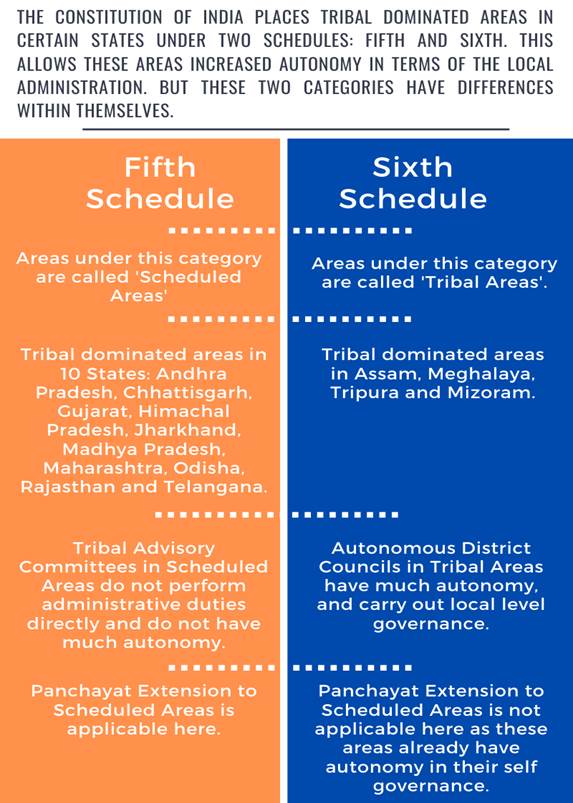Description

Copyright infringement not intended
In News
- The Lok Sabha passed the Constitution (Scheduled Tribes) Order (Fourth Amendment) Bill, 2022 to include Betta-Kuruba in the Scheduled Tribes (STs) list of Karnataka as a synonym for the already categorised Kadu-Kuruba tribe in the State.
The Process of adding to the ST List
- The process of adding tribes to the ST list starts with a recommendation from the State governments.
- It is sent to the Tribal Affairs Ministry, which reviews and sends them to the Registrar General of India, Under the Home Ministry for approval.
- After approval, it is sent to the National Commission for Scheduled Tribes and then sent to the Cabinet for a final decision.
- Once the cabinet finalizes it, then it introduces a bill in the parliament to amend the Constitution (Scheduled Castes) Order, 1950, and the Constitution (Scheduled Tribes) Order, 1950.
- After the amendment bill is passed by both the Lok Sabha and Rajya Sabha, the President’s office takes the final decision under Articles 341 and 342 of the Constitution:
.jpg)
Betta-Kuruba tribe
- The Betta Kuruba tribe lives in the hilly regions of Karnataka and is one of the few indigenous communities of the Nilgiris.
- They belong to the Hindu caste native to the Indian states of Karnataka, Tamil Nadu, Andhra Pradesh and Telangana.
- Traditionally, the Kuruba people drew sustenance from hunting, gathering and collecting wild honey.
- They practised sheep/goat and cattle pastoralism, in that they either herded exclusively sheep, or a mixed herd of sheep and goats, or cattle.
- They are generally believed to be the descendants of the Pallavas.
- Consanguineous marriages like cross-cousin marriages are preferred among the Kurumbas.
Tribal Area
- The Indian Constitution states two types of areas:
- Scheduled Areas in terms of the 5th Schedule of the Constitution.
- Tribal Areas in terms of the 6th Schedule.
- “The “Tribal Areas” are also mentioned under Article 244(2) of the Constitution.
- For the declaration of Scheduled Areas, the criteria followed are;
- The predominance of the tribal population.
- Closeness and reasonable size of the area.
- Presence of a viable administrative unit such as a district, block or taluk.
- Economic backwardness of the area as compared to neighbouring areas.
.jpg)

Constitutional Safeguards for STs
- Article 15, Special provisions for the advancement of other backward classes (which includes STs).
- Article 29, Protection of Interests of Minorities (which includes STs).
- Article 46, State Shall Promote, with Special care, the educational and economic interests of the weaker sections of the people, and in particular, of SCs, and the STs, and shall protect them from social injustice and all forms of exploitation.
- Article 164, Provides for Tribal Affairs Ministers in Bihar, MP and Orissa.
- Article 243, Reservation of seats in Panchayats.
- Article 244, Provisions of the 5th Schedule shall apply to the administration & control of the Scheduled Areas and Scheduled Tribes in any State other than the states of Assam, Meghalaya, Mizoram and Tripura which are covered under the 6th Schedule.
- Article 275, Grants in-Aid to specified States (STs&SAs) covered under 5th and 6th Schedules.
- Article 330, Reservation of seats for STs in Lok Sabha.
- Article 337, Reservation of seats for STs in State Legislatures.
- Article 334, 10 years period for reservation (Amended several times to extend the period).
- Article 350, Right to conserve distinct Language, Script or Culture.
- Article 350, Instruction in Mother Tongue.
- Article 371, Special provisions in respect of the NE States and Sikkim.
- Service Safeguards under Art 16, 335, and 320.
- Safeguards under Various laws:
- SCs & STs (Prevention of Atrocities) Act.
- Bonded Labour System (Abolition) Act.
- Child Labour (Prohibition and Regulation) Act.
- Forest Conservation Act, Panchayati raj (Extension to Scheduled Areas) Act.
- Minimum Wages Act 1948.
https://epaper.thehindu.com/Home/ShareArticle?OrgId=GH4ALEQBO.1&imageview=0
https://t.me/+hJqMV1O0se03Njk9














